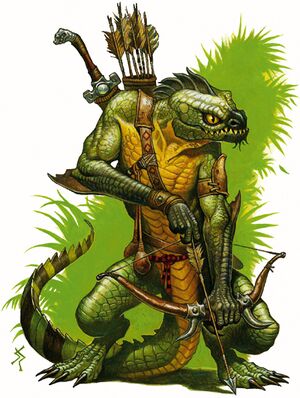Lizardfolk are commonly seen as savages and cannibals, but when treated fairly, these cold-hearted lizards are valued allies and powerful warriors.
Physical Appearance
Majority of lizardfolk resemble iguana-descended humanoids with thick scales covering skin and a hard spine that runs down their back down to their tail. Their scales vary between bright blues to all shades of yellow and green and sometimes a dusky brown.

Some lizardfolk originate from other species of lizard such as geckos and chameleons, with scale colors varying accordingly. Scale coloration varies from a bright blue to all shades of yellow and green and several hues of dusky brown. They stand taller than humans, ranging between 6 to 7 feet tall and are about 200 to 250 pounds.
Lifestyle
Lizardfolk live in tribes that can consist of anywhere from 3 to 20 families. To continue their survival, cannibalism is common since the dead are seen as a valued food source. Their tribes contain hatcheries which are integral elements to their society. Juveniles live in these hatcheries for the first years of their loves before returning to their families. They are protected by the tribe's strongest warriors and are taught how to work and contribute from birth. Mothers rotate shifts in the hatcheries so that younglings can learn to value those who gave them life as well acquire a wide range of skills.
Language
All lizardfolk use the Draconic language for their communication. To mark their territory, lizardfolk arrange stones or hack letters into trees using simple Draconic words. They can learn other languages, but speak with a hissing accent regardless of what language they are speaking.
Writing is mostly scarce among lizardfolk since orally communicating plays a central role in lizardfolk life when communicating tribal histories and stories over meals.
